“The question is not, ‘Can we?’ but ‘Should we?’”
Michael Crichton’s two questions summarize ethics.
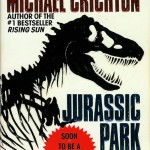 I had been leading my classes through a mini-unit on medical ethics at the same time I was reading Jurassic Park. At appropriate moments, I read excerpts to the class. Crichton used a chaos scientist as the foil for his belief that experimentation has boundaries. Michael Crichton’s medical career brought new life to science fiction writing. He believed that science, like life, should have limitations.
I had been leading my classes through a mini-unit on medical ethics at the same time I was reading Jurassic Park. At appropriate moments, I read excerpts to the class. Crichton used a chaos scientist as the foil for his belief that experimentation has boundaries. Michael Crichton’s medical career brought new life to science fiction writing. He believed that science, like life, should have limitations.
“Do you want to go see the movie with me?” I asked. Excitement immediately filled the room. Stephen Spielberg’s version of Crichton’s tale was about to hit the big screen. So I and group of 25 students attended the opening of Jurassic Park. The whispered discussions in the theatre and full-throated dialogue after accomplished my goal: to teach teens to watch movies with their minds, not their eyes. 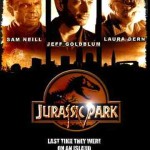
Video clips engaged almost every class period in my teaching. I would show nightly news clips, parts of television comedies, news magazines, or film segments for whatever lesson or unit I taught. My interest was always the same. I wanted students to think about what they watched.
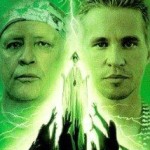 Genetic engineering was part of our discussion. I summarized H.G. Wells classic The Island of Dr. Moreau then showed segments from the 1996 version of the movie. In an attempt to create the perfect creature a brilliant geneticist crosses human and animal DNA. The result of the unethical experimentation is brutish and cruel. H. G. Wells shows the end results of human attempts to be God. Confronted by one of the “beast men” in a vexing, violent scene toward the end of the movie, the main character identifies the basic problem of control. With so many in charge, the question remains, who is “the number one God?” “Who will control the controllers?” is a perennial question, one which every generation must answer.
Genetic engineering was part of our discussion. I summarized H.G. Wells classic The Island of Dr. Moreau then showed segments from the 1996 version of the movie. In an attempt to create the perfect creature a brilliant geneticist crosses human and animal DNA. The result of the unethical experimentation is brutish and cruel. H. G. Wells shows the end results of human attempts to be God. Confronted by one of the “beast men” in a vexing, violent scene toward the end of the movie, the main character identifies the basic problem of control. With so many in charge, the question remains, who is “the number one God?” “Who will control the controllers?” is a perennial question, one which every generation must answer.
Night Falls on Manhattan (1998) presents the perfect caution for any discussion of ethics. The biblical principle of “the ideal and 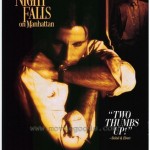 the real” is no where better summarized on screen. A “cut and dried” legal case launches the career of a district attorney. Discovery of unsavory, unethical details, however, costs the life of a “good” police officer. The final speech given by Andy Garcia’s character is an exact replica of the biblical teaching: in this corrupt world, nothing is totally pure or innocent.
the real” is no where better summarized on screen. A “cut and dried” legal case launches the career of a district attorney. Discovery of unsavory, unethical details, however, costs the life of a “good” police officer. The final speech given by Andy Garcia’s character is an exact replica of the biblical teaching: in this corrupt world, nothing is totally pure or innocent.
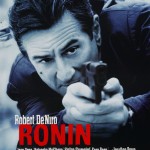 No innocent, an ex-CIA agent plies his trade to live in Ronin (1997). What he discovers is that no one can “go it alone”. Healing from a wound inflicted during a gun battle, Robert DeNiro’s character is taught a lesson from an older spy. Everyone serves something or someone outside of themselves. Transcendence, someone is separate from, outside us, is exactly the point of Bob Dylan’s song “Ya’ Gotta’ Serve Somebody.” Ethics must have an external, eternal measure.
No innocent, an ex-CIA agent plies his trade to live in Ronin (1997). What he discovers is that no one can “go it alone”. Healing from a wound inflicted during a gun battle, Robert DeNiro’s character is taught a lesson from an older spy. Everyone serves something or someone outside of themselves. Transcendence, someone is separate from, outside us, is exactly the point of Bob Dylan’s song “Ya’ Gotta’ Serve Somebody.” Ethics must have an external, eternal measure.
Woody Allen masterfully brought attention to the eternal issue surrounding ethics in Crimes and 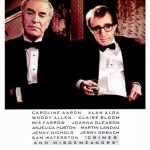 Misdemeanors (1989). An extra-marital affair leads a man to hire out the murder of his mistress. Packed with ethical discussion, Woody Allen identifies all the issues that surround the human dilemma of right and wrong. In a dream sequence, Martin Landau’s character interacts with his family around a dinner table about what values drive human action. Major philosophies and religious beliefs are all given voice in this exceptional five minute scene. My students were left with the question “What does my choice between right and wrong matter?”
Misdemeanors (1989). An extra-marital affair leads a man to hire out the murder of his mistress. Packed with ethical discussion, Woody Allen identifies all the issues that surround the human dilemma of right and wrong. In a dream sequence, Martin Landau’s character interacts with his family around a dinner table about what values drive human action. Major philosophies and religious beliefs are all given voice in this exceptional five minute scene. My students were left with the question “What does my choice between right and wrong matter?”
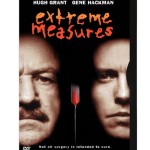 Two different scientists address the question of right and wrong in Extreme Measures (1996). A doctor rounds up and kills homeless men to discover a cure for paralysis. His secret, yet undiscovered methods, bring notoriety until a fellow physician reveals the truth. Gene Hackman’s intentions are exposed in a debate between the two ethical arguments. My students were led to the utilitarian question, “If you could kill one man to discover the cure to cancer, wouldn’t you have to do that?”
Two different scientists address the question of right and wrong in Extreme Measures (1996). A doctor rounds up and kills homeless men to discover a cure for paralysis. His secret, yet undiscovered methods, bring notoriety until a fellow physician reveals the truth. Gene Hackman’s intentions are exposed in a debate between the two ethical arguments. My students were led to the utilitarian question, “If you could kill one man to discover the cure to cancer, wouldn’t you have to do that?”
Every day ethical questions form the frame for Robert Redford’s Quiz Show (1995); the true story of 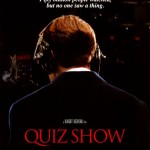 television’s early quiz show format. It seems that some participants in 1950’s television quiz shows knew the answers ahead of when the program aired. Ralph Fiennes’ character finds it easier and easier to get the answers before the questions are asked. The truth is found out and the cover-up ruins a man and his career. Students came to grips with the question, “What would we do with the pressure of fame and money pressing upon us?” While I would encourage viewing of the whole movie for thematic development, I showed the scene when the son confesses to the father what he had done. The result of one’s ethical choices always affect more than just the individual.
television’s early quiz show format. It seems that some participants in 1950’s television quiz shows knew the answers ahead of when the program aired. Ralph Fiennes’ character finds it easier and easier to get the answers before the questions are asked. The truth is found out and the cover-up ruins a man and his career. Students came to grips with the question, “What would we do with the pressure of fame and money pressing upon us?” While I would encourage viewing of the whole movie for thematic development, I showed the scene when the son confesses to the father what he had done. The result of one’s ethical choices always affect more than just the individual.
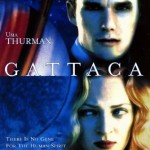 No better movie to summarize the necessity of limitations on ethical choices is Gattaca (1997) . I would show the clip nine minutes into the film where Ethan Hawke’s character discusses “genoism”: chosing the genetic make up of children from inception, excluding those children who do not make the cut. In five minutes, students were brought face-to-face with the ultimate issue in medical or any kind of ethics, “Are we trying to play God?”
No better movie to summarize the necessity of limitations on ethical choices is Gattaca (1997) . I would show the clip nine minutes into the film where Ethan Hawke’s character discusses “genoism”: chosing the genetic make up of children from inception, excluding those children who do not make the cut. In five minutes, students were brought face-to-face with the ultimate issue in medical or any kind of ethics, “Are we trying to play God?”
Should we or shouldn’t we? If “shoulds” and “oughts” exist, we are assuming there must be a boundary, a limitation to our actions. Students learned through movie clips that words can be buttressed by images. The visual can serve the verbal. Pictures can help us understand the power of words.
limitation to our actions. Students learned through movie clips that words can be buttressed by images. The visual can serve the verbal. Pictures can help us understand the power of words.
Movies can arrest attention, making us stop to consider “What will happen if I do this?”
Mark believes Jurassic Park and every other movie about ethics can be part of a cultural conversation. How we think, how we express our thoughts in words, can be benefited by film. Dr. Mark Eckel has been teaching movie engagement for 30 years to many students. He is Professor of Leadership, Education & Discipleship at Capital Seminary & Graduate School.

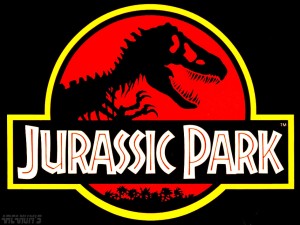
“Your scientists were so busy trying to see if they could that they didn’t bother to stop and think if they should.” -Dr. Ian Malcolm
Ideas have consequences. So do actions. Sometimes, we do not see the consequences of ideas for years. Same with actions. But every idea we have and every action we take has consequences.
Thank you for this examination of ethics found in movies, Dr. Eckel. I think movies like Gattaca and The Island make powerful statements about human beings.